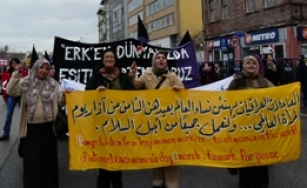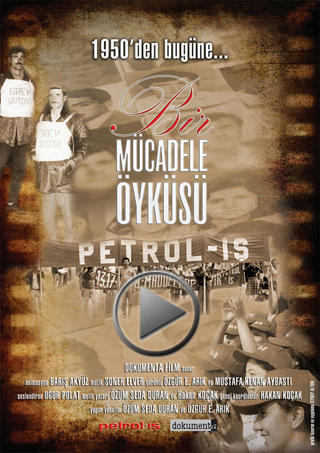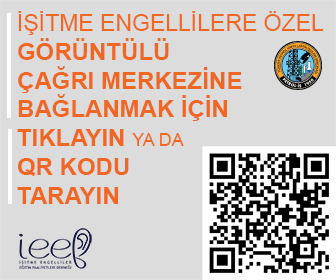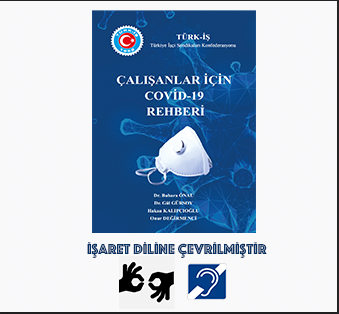Women’s newsletter announces ICEM set of meetings, activities

A full slate of ICEM Women’s meetings is scheduled for this spring, starting with the Central European Women’s Conference, 20-21 May, in Bucharest, Romania, followed by the Sub-Saharan Africa Regional Women’s Committee meeting in Johannesburg, South Africa, on 25 May. On 21 June, in Geneva, the ICEM Women’s Committee meeting will be held.
Turkey – Turkish/Iraqi Women’s Seminar
On the occasion of 8 March, International Women’s Day, ICEM organized a workshop for women of ICEM affiliates from Iraq and Turkey. The workshop was held with the support of the American Solidarity Center. Turkish affiliate Petrol-İş hosted the meeting and helped with logistics. Twelve women traveled from Iraq to Istanbul to celebrate International Women’s Day. A march was conducted through the streets of Istanbul and stretched further than the eye could see. ICEM Executive Committee member Hashmeyia Muhsin Saadawi of Iraq was instrumental in putting the meeting together.
At workshops held on 9 and 10 March, Turkish and Iraqi women worked on topics involving mostly women’s health and trade union rights. The meeting was held against the backdrop of the financial crisis. Gender differences are striking within crisis – the economic crisis affects women and men differently, the food crisis affects women and men differently, and health affects women and men differently. Gender differences between women and men in employment mean that men and women do not do the same job. This is particularly striking in times of crisis.
Because of how gender roles are traditionally perceived, men are considered to be the primary breadwinners. Thus, women’s jobs are considered to be disposable. But women nevertheless need to keep working, which means they are forced to take worse jobs on the employment ladder, or fall into jobs in the informal economy.
The President of Petrol-İş, Mustafa Öztaskin, opened the meeting on behalf of the 13 Turkish unions affiliated to the ICEM. Women are more vulnerable in the labour market and are being laid off in Turkey.
Although Petrol- İş only has 1,670 women members, it does training for women and has a separate budget for women. In 2008, the union did training for women and men with a quota to guarantee women’s participation. Women’s committees exist in different regions. Kadin is the only women’s magazine within the Turkish trade union movement, and it serves as reference material for other trade unions in Turkey. In 2007, a competition was organized for women’s stories. Some 497 stories were received. The stories were awarded and compiled into a book.
A presentation was given on women in Turkey. The women’s situation is not only precarious in working life, but Turkish society is reflected in working life. Women are invisible in work and society. According to the World Economic Forum, women’s position in Turkey is among the worst. In 2007, Turkey ranked 121st out of 128 countries. Since the 1980s, fewer women are working in Turkey, and when women do not work they do not participate or voice their problems. Fewer women are working because of migration to cities. Women became jobless because they were not thoroughly educated for urban employment. Turkey still has not solved the issue of literacy. In addition, women work in unregistered employment, the biggest problem inside Turkish worklife because workers have no social security. Small enterprises have different laws, which mean that workers, in particular women, are far from gaining social security. Women are vulnerable; they are the last hired and the first laid off. There are regulations and laws on paper, but the problem is implementation. Employers try to evade legislation to cut costs. They employ women illegally. Women suffer most from poverty. They are not included in statistics. Women work in households since they do want to contribute economically. Women can work if fathers and husbands allow them to – men usually object to women working in businesses. In crisis circumstances, when the male figure is jobless, women can work, but still the man is head of the household in spite of a woman’s contribution. Household jobs are not considered to be proper jobs; men’s jobs are considered to be proper jobs.
Sexual harassment also works against women. There are laws against it, but no sufficient sanctions. Many women are not aware of sexual harassment, but they are exposed to it. Childcare is a major problem in addition. The lack of childcare keeps women from participating. Social services are inadequate in Turkey. Women start working when they are single. When they get married and have children, they stop because there is no place to leave the children. Previously, the law provided for childcare, but that has changed. It is only when women have family members that they can work. Enterprises consider women to be a burden because of paid maternity leave. Women are more and more becoming housewives, which makes them more and more invisible. Women are not organized. Only 15% of women are in trade unions. Women do not know what trade unions do. Trade unions should increase women’s awareness of their functions. There are few women leaders and low women’s representation. Some women are present at enterprise level, but no higher. Trade unions claim they represent the workforce, but they have no specific policies for women. Trade unions ought to promote this issue and do campaigns.
The Iraqi delegation presented the women’s situation in their country. Starting with the Baath political regime, the government was very oppressive and despotic. It violated women’s rights in all areas in spite of signing agreements concerning women. Women were not allowed to leave the country without a man’s consent; women were not allowed to be members of the judiciary; women were left behind in the family and social structure; women were subject to psychological and bodily pressure; they were jailed especially for political reasons. When women were killed for so-called honour reasons, the regime was silent about it. Women had to earn money by unethical and illegal means. Iraqi women lost all the rights they had gained in 1950. Iraqi women suffered from mass migration, and they ended up in mass graves. They lost sons and husbands, especially in Kurdistan. Since there was scarce employment, women were often unemployed.
In 2004, a 25% quota for women was introduced. Still, these decisions are not implemented in real life. Women face poverty, unemployment, discrimination, and security problems; they live in fear and anxiety. Women are afraid to join unions and NGOs. Women are under-represented in Iraqi communities.
When it comes to industrial or job production, men comprise the overwhelming majority. Women were only allowed to study certain things. It is hard to know how to combat prejudices in society. Men manipulate women’s issues by politicizing these issues and designating certain issues only for men. In crises, men have traditional roles. In society, women are mainly responsible for the family. The struggle is to get the same rights for women as for men. Women are never given a real role; they are marginalized by men and hidden in society. Many women do not attend training because they are afraid of their husbands. Only when they are adequately represented, will women be able to stand up to men.
Article 409 in Iraq states that it is possible to commit honour killings. This article must be annulled. Men can kill women. If a woman has a male friend, she is liable to be killed. A petition has been started among working women to annul the article.
Since 1921, Iraqi women faced many problems and nearly starved during the 35 years of Saddam’s regime. Women go to women’s departments in trade unions to discuss their problems since they are unable to talk to men about them. There used to be a women’s trade union of the Baath Party, but women suffered from it.
In Basra, health problems were surveyed among women. Cancer is rampant due to uranium and chemical residue. Water was also investigated. Barrels full of chemicals have been filled with water.
The women concluded that Turkish and Iraqi women should cooperate at all levels.
Working groups discussed women’s health. One problem was seen to be shift work. No one wants to work the night shift. Wrist problems are due to the fact that something has to be produced every five seconds. A need was cited that ergonomic chair-people are essential in worklife. Dust can clog up lungs and cellulose can lead to asthma. Noise is a further problem.
Workers in Turkey do not earn enough to participate in cultural life adequately, and night work prohibits it altogether. Leg pains arise from standing in the same position for hours on end. Çimse-İş reported that its members performed shift work before the economic crisis, but now they only work one ten-hour shift. Machines determine the pace.
Women work on a clock to indicate how much they accomplish in a day. They have no time for themselves and must be exhausted. They were applauded for how much they do.
Family-friendly policies are needed in unions and societies. The reasons for women not to join unions are similar in Iraq and Turkey. One difference is that in Turkey, the honour killings are no longer possible by law. One conclusion can be to demand gender training in unions.
In the session on collective bargaining, it was a question of leave, structures, maternity regulations, etc. The Iraqi economy rested on women’s shoulders for a long time because of the war with Iran. Women are still seen as second-class citizens, but many men want them to be third or fourth class. No women’s committees exist in the national labour centres DİSK or Türk-İş. One woman said, “It’s like trying to dig a well with a needle.” Structures are necessary to assure continuity.
In Petrol-İş, the situation could be improved with more trade union density. With more membership, it would be possible to be more effective; there is potential. Because there is a low level of organisation, not all demands are met. The financial crisis affects what is possible to achieve. The number one priority has to be to keep members’ jobs. Some 1,500 workers affiliated to the union have lost their jobs due to the crisis.
Two women from Novamed presented their experiences from the 14-month strike, which ended successfully at the end of 2007. It is an example of what women can achieve with determination and international solidarity.
Working groups worked on collective bargaining and setting priorities. They looked at job security, equal pay, health and safety, trade union rights, respect, maternity leave, childcare, training, and pensions. Trade union rights were seen to be an important priority.
The main conclusion from the workshops was that women should unite. They felt that only when women join together will men not be able to manipulate them. They decided to create a platform and network for future action. (21 April 2009)















